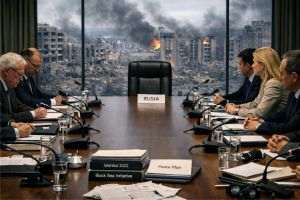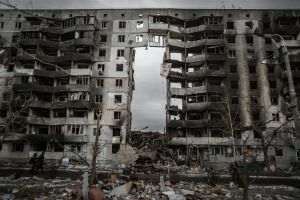European Commission President Ursula von der Leyen is considering imposing serious sanctions against the Nord Stream 2 consortium if Russia does not accept a 30-day ceasefire in Ukraine, Commission spokeswoman Paula Pinho said yesterday at a press conference. Asked about Europe's options if the Kremlin refuses this request and about the impact of the 17th package of economic sanctions against Russia, Pinho noted that von der Leyen had already suggested a possible measure last Saturday during a videoconference with the leaders of Germany, France, Poland and the United Kingdom, held in the context of her visit to Ukraine, when the Commission President raised the possibility of sanctioning the consortium that manages the Nord Stream 2 natural gas pipeline.
Previously, the American publication Wall Street Journal had reported that von der Leyen had already held discussions on this issue with German Chancellor Friedrich Merz (CDU), during a meeting held last Friday in Brussels. According to European sources cited by American journalists, a possible sanction against Nord Stream 2 would be separate from a new official package of sanctions by the European Union, but could be applied if Russia refuses or violates the proposed truce.
This possible measure comes as Ukraine's allies warn Moscow that a new escalation of the conflict will attract additional sanctions. In parallel, the European Commission last week presented a broad plan to gradually ban gas imports from Russia, in two stages: the first provides, by the end of this year, for a ban on purchases on the spot market and the signing of new contracts; the second stage involves a complete stoppage of Russian gas imports by the end of 2027 at the latest.
Although EU officials have claimed that this plan will remain in force regardless of the signing of a peace agreement, the Wall Street Journal notes that there has been speculation in recent months about a possible relaxation of the ban, if Russia were to accept a fair deal for Ukraine.
We recall that Germany suspended the Nord Stream 2 project just two days before the Russian invasion in February 2022, following President Vladimir Putin's recognition of the separatist regions of Donetsk and Luhansk. Shortly after this gesture, former US President Joe Biden announced sanctions against the Nord Stream 2 AG company and its management, previously stating: "If Russia invades Ukraine, Nord Stream 2 will no longer exist. We will end the project".
The situation became even more complicated in September 2022, when both Nord Stream pipelines were seriously damaged following an act of sabotage near the island of Bornholm. Since then, various hypotheses have circulated regarding the perpetrators of the attack. American journalist Seymour Hersh claimed that the US had orchestrated the explosion. Other German journalists indicated the involvement of Ukrainian secret services, but the leadership in Kiev categorically rejected this hypothesis in August 2024, describing it as "absurd".
Amidst these controversies, US President Donald Trump announced on May 5, 2025 that he was not willing to open an official investigation to identify the culprits, stating that "many know who blew up the pipelines". Recall that previously, on October 31, 2024, during the presidential campaign, Trump stated that he himself would have been "the one who stopped the construction", precisely to prevent the completion of the project, in an interview with Tucker Carlson. Moreover, Donald Trump has stated on several occasions that the Russian Federation would not have been involved in the sabotage, while also suggesting that the US would have had an active role in the incident.
In this tense context, in which Europe seeks to reduce its energy dependence on Russia, and diplomatic efforts for a ceasefire in Ukraine continue, discussions on sanctioning Nord Stream 2 are reigniting the geopolitical debate related to energy security and the balance of power in the region.















































